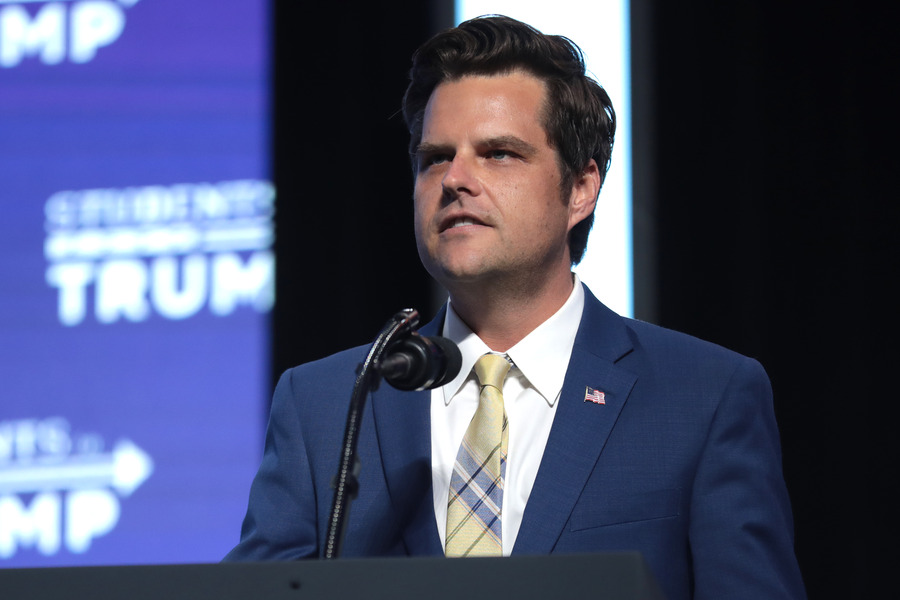The Friendliest Lawsuit Ever Filed Against the FBI
Last month, I sued the Justice Department in what I described as perhaps the friendliest lawsuit ever filed against it. Yesterday, I filed an equally friendly suit—this time against the FBI. The purpose is the same: to show conclusively that President Trump and his White House staff are lying about career federal law enforcement officers, their actions, and their attitudes.
Published by The Lawfare Institute
in Cooperation With

Last month, I sued the Justice Department in what I described as perhaps the friendliest lawsuit ever filed against it. Yesterday, I filed an equally friendly suit—this time against the FBI. The purpose is the same: to show conclusively that President Trump and his White House staff are lying about career federal law enforcement officers, their actions, and their attitudes. The first suit seeks to show, as I wrote last month, that the President is lying about Justice Department terrorism data:
In February, speaking before a joint session of Congress, President Trump declared that: “according to data provided by the Department of Justice, the vast majority of individuals convicted of terrorism and terrorism-related offenses since 9/11 came here from outside of our country.”
There's a lot of reason to believe this statement is a compound lie—both to believe that the vast majority of individuals convicted of terrorism-related crimes did not come here from elsewhere and to believe that the career men and women of the Department of Justice did not provide any data suggesting otherwise.
Yesterday's suit involves the firing of James Comey and the President's lies about the reasons for it, as well as about the supposed turmoil at the FBI that justified it. The lies about Comey have continued up until yesterday and they are disgusting. But for present purposes, I am more concerned about the lies about the FBI rank and file—who cannot speak for themselves in public. As I wrote back in June in filing the Freedom of Information Act request that gave rise to yesterday's suit:
When President Trump fired FBI Director James Comey, the White House quickly stepped up to slime Comey. Deputy Press Secretary Sarah Huckabee Sanders announced that "The President, over the last several months, lost confidence in Director Comey. The DOJ lost confidence in Director Comey. Bipartisan members of Congress made it clear that they had lost confidence in Director Comey. And most importantly, the rank and file of the FBI had lost confidence in their director." The following day, she declared that "I've heard from countless members of the FBI that are grateful and thankful for the President’s decision. . . . I certainly heard from a large number of individuals—and that's just myself—and I don't even know that many people in the FBI." Trump himself reportedly called Comey a "nut job" in his conversations with the Russians. And he told NBC's Lester Holt that Comey was "a showboat. He's a grandstander." The FBI, he said, "has been in turmoil. You know that, I know that, everybody knows that. You take a look at the FBI a year ago, it was in virtual turmoil—less than a year ago. It hasn't recovered from that."
In a rather sharp contrast, Acting FBI Director Andrew McCabe disputed the notion that the FBI had lost confidence in its leader before the Senate Intelligence Committee. "Director Comey enjoyed broad support within the FBI and still does to this day," he said. "I can confidently tell you that the majority, the vast majority of FBI employees enjoyed a deep and positive connection to Director Comey."
Former FBI analyst Nora Ellingsen, in an excellent post on this site a few weeks ago, amplified on McCabe's comments: "the basic truth is that while Comey was a controversial figure in the larger political system and among Justice Department officials, he was not a controversial figure at the FBI at all. Nearly everyone loved him. In any other piece, I would caveat this statement as obvious hyperbole and oversimplification of the situation, but the degree of consensus on this point as I have talked to people has been incredible. In the most literal sense of the word, it’s almost hard to believe."
After reading Ellingsen's piece, a thought occurred to me: this is a factual dispute with a large body of objective evidence behind it. When you decapitate an organization like the FBI, managers have to tell their staffs, after all. They do this, I imagine, by writing an email to their staffs. In an organization "in turmoil," one run by a "nut job," in whom the rank and file have "lost confidence," one might expect such an email to have a celebratory flavor, to talk about how the long national nightmare is over, say, or how there's a great opportunity to restore sanity to the organziation. On the other hand, when a beloved leader is removed by a President in what is seen as an attack on the institution, one might expect an email with a very different tone. The FBI has lots of managers who will have had to send emails to their staffs.
So I requested those emails to the extent they are unclassified. I sought, among other things:
- All records of unclassified communications from Andrew McCabe to the FBI workforce addressing the firing of Director James Comey, including, but not limited to, emails, official statements, announcements, and memoranda. The timeframe for this request is from May 9, 2017, until the date that a search is conducted for records responsive to this FOIA request.
- All records of unclassified communications from Associate Deputy Director to the FBI workforce addressing the firing of Director James Comey, including, but not limited to, emails, official statements, announcements, and memoranda. The timeframe for this request is from May 9, 2017, until the date that a search is conducted for records responsive to this FOIA request.
- All records of unclassified communications from the Chief of Staff to the FBI workforce addressing the firing of Director James Comey, including, but not limited to, emails, official statements, announcements, and memoranda. The timeframe for this request is from May 9, 2017, until the date that a search is conducted for records responsive to this FOIA request.
- All records of unclassified communications from Deputy Chief of Staff to the FBI workforce addressing the firing of Director James Comey, including, but not limited to, emails, official statements, announcements, and memoranda. The timeframe for this request is from May 9, 2017, until the date that a search is conducted for records responsive to this FOIA request.
- All records of unclassified communications from any other member of the Senior Executive Service within the Office of the Director to the FBI workforce addressing the firing of Director James Comey, including, but not limited to, emails, official statements, announcements, and memoranda. The timeframe for this request is from May 9, 2017, until the date that a search is conducted for records responsive to this FOIA request.
- In addition to the records requested above, I also request records describing the processing of this request, including records sufficient to identify search terms used and locations and custodians searched and any tracking sheets used to track the processing of this request. If your agency uses FOIA questionnaires or certifications completed by individual custodians or components to determine whether they possess responsive materials or to describe how they conducted searches, I also request any such records prepared in connection with the processing of this request.
I also asked for similar records from several branches of the Bureau, including the National Security Branch; the Criminal, Cyber, Response and Services Branch; the Intelligence Branch; the Science and Technology Branch; the Human Resources Branch; and the individual FBI Field Offices. From each, I sought:
All records of unclassified communications from [leadership of the named branch or division] to the [named branch or division] workforce addressing the firing of Director James Comey, including, but not limited to, emails, official statements, announcements, and memoranda. The timeframe for this request is from May 9, 2017, until the date that a search is conducted for records responsive to this FOIA request.
In addition to the records requested above, I also request records describing the processing of this request, including records sufficient to identify search terms used and locations and custodians searched and any tracking sheets used to track the processing of this request. If your agency uses FOIA questionnaires or certifications completed by individual custodians or components to determine whether they possess responsive materials or to describe how they conducted searches, I also request any such records prepared in connection with the processing of this request.
While the Bureau has released some information responsive to other components of the FOIA requests, it has not responded to this aspect of it. So yesterday, I sued.
Here's the complaint I filed, represented by the folks at the Protect Democracy Project:
Who knows? Perhaps these documents will reveal an agency in turmoil, one whose rank and file had lost confidence in their director, one brimming with gratitude to President Trump for his decisive action in removing the "nut job." But don't hold your breath for a lot of "Ding Dong, The Witch is Dead" subject lines. I believe these documents, when the Bureau is finally forced to release them, will show that the White House's claims have been bald-faced lies—that Ellingsen was right about the attitudes of her former colleagues towards Comey, that McCabe was courageously telling the truth on the subject in his congressional testimony, and that the Bureau was not in turmoil before Comey's removal but reacted with shock to it.
My guess is that these documents will show that the only true statement Sanders has made on the subject is that she doesn't, in fact, know many people at the FBI.





